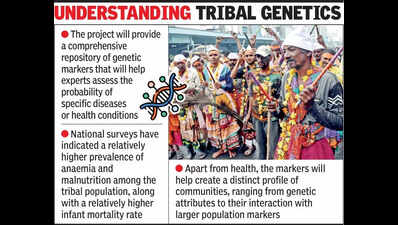Lifestyle
Gujarat Launches Pioneering Genome Mapping Project for Tribes

In a groundbreaking initiative, the state of Gujarat has announced the launch of a large-scale genome mapping project dedicated to its tribal communities. This extensive study aims to collect 4,158 biological samples from individuals across 17 districts with significant tribal populations. The project will generate approximately 2,000 whole genome sequences, providing critical insights into the genetic diversity of over 20 tribal communities.
During a session titled ‘Creation of Reference Genome Database for Tribal Population in Gujarat’ held on March 6, 2024, officials discussed the project’s details. The session was chaired by Kuber Dindor, the minister of tribal development, and Kunwarji Halpati, the minister of state for tribal development. They were joined by scientists from the Gujarat Biotechnology Research Centre (GBRC), officials from the department of science and technology, and tribal development experts. “This is the first such initiative in the country, focusing exclusively on tribal groups,” an official stated.
Significance of the Genome Mapping Project
The genome mapping project represents a significant step towards merging scientific research with the rich traditions of Gujarat’s tribal communities. The data collected will enhance understanding of the genetic health and diversity within these populations, which make up nearly 15% of the state’s total population. The communities involved in the study include the Bamcha, Garasia Bhil, Dholi Bhil, Chaudhari, Dhanka, Tadvi, Valvi, Dubla, Gamit, Gond, Kathodi, Kukna, Kunbi, Nayaka, Pardhi, Patelia, Rathwa, Warli, Kotwalia, and others. Notably, the Sidi community, known for its African ancestry, will also participate.
Each tribe will contribute at least one genetic trio for the study, meaning samples will be collected from both parents and a child to trace inherited genetic traits. The study will focus on healthy individuals aged 18 and above, ensuring that no participants have visible blood disorders. Furthermore, officials aim for a target of 50% female representation in the sampling.
Health and Community Impact
The project is not only a scientific endeavor but also a means to address health and welfare needs in tribal populations. Dindor described it as a bridge between science and tradition, emphasizing its potential to provide personalized and community-level genetic insights. The genome data will create a comprehensive repository of genetic markers, helping experts assess the likelihood of specific diseases or health conditions.
National surveys have highlighted a higher prevalence of anaemia and malnutrition within tribal populations, alongside increased infant mortality rates. By identifying genetic markers, the project aims to create distinct profiles for these communities, ranging from their genetic attributes to their interactions with larger population markers. This data can ultimately inform public health initiatives and improve health outcomes for tribal populations.
Local administrative bodies will play a crucial role in disseminating information and obtaining informed consent from participants. This initiative marks a pioneering effort in ensuring that Gujarat’s tribal communities are represented in genetic research, setting a precedent for future studies across India.
As Gujarat embarks on this ambitious project, it stands at the forefront of integrating modern science with traditional knowledge, paving the way for improved health and welfare for its tribal populations.
-

 World5 months ago
World5 months agoSBI Announces QIP Floor Price at ₹811.05 Per Share
-

 Lifestyle5 months ago
Lifestyle5 months agoCept Unveils ₹3.1 Crore Urban Mobility Plan for Sustainable Growth
-

 Science5 months ago
Science5 months agoNew Blood Group Discovered in South Indian Woman at Rotary Centre
-

 World5 months ago
World5 months agoTorrential Rains Cause Flash Flooding in New York and New Jersey
-

 Top Stories5 months ago
Top Stories5 months agoKonkani Cultural Organisation to Host Pearl Jubilee in Abu Dhabi
-

 Sports5 months ago
Sports5 months agoBroad Advocates for Bowling Change Ahead of Final Test Against India
-

 Science5 months ago
Science5 months agoNothing Headphone 1 Review: A Bold Contender in Audio Design
-

 Top Stories5 months ago
Top Stories5 months agoAir India Crash Investigation Highlights Boeing Fuel Switch Concerns
-

 Business5 months ago
Business5 months agoIndian Stock Market Rebounds: Sensex and Nifty Rise After Four-Day Decline
-

 Sports5 months ago
Sports5 months agoCristian Totti Retires at 19: Pressure of Fame Takes Toll
-

 Politics5 months ago
Politics5 months agoAbandoned Doberman Finds New Home After Journey to Prague
-

 Top Stories5 months ago
Top Stories5 months agoPatna Bank Manager Abhishek Varun Found Dead in Well









